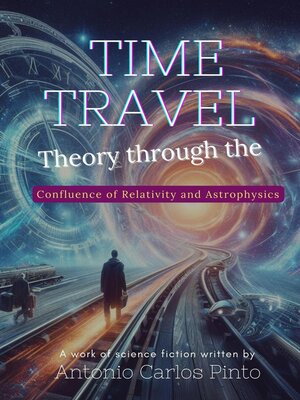Time Travel Theory through the Confluence of Relativity and Astrophysics
ebook
By Antonio Carlos Pinto

Sign up to save your library
With an OverDrive account, you can save your favorite libraries for at-a-glance information about availability. Find out more about OverDrive accounts.
Find this title in Libby, the library reading app by OverDrive.



Search for a digital library with this title
Title found at these libraries:
| Loading... |
In the search to understand the origins of the universe, we enter an enigmatic realm, where science and philosophy intertwine in dense shadows and mythological resonances. Genesis, in its primordial description of darkness and emptiness before light, echoes the very whisper of the Big Bang, where the universe lay in a state of infinite density, awaiting the explosion that would give it life.
These stories transcend borders and delve into mysteries that echo in every atom of our existence. Science and philosophy converge, eager to uncover the deepest secrets of the cosmos.
As we delve deeper into these convergences, we are called to reflect on the implications that echo through the corridors of time. Not just about the birth of the universe, but about the broad meaning of our existence in its intricate web.
We move forward, revealing the secrets of creation and the roots of the cosmos. Invited to explore, to understand, the mysteries that permeate the human journey in the starry vastness.
Philosophical interpretations of light and darkness have transcended the domain of science, entering the metaphysical and cosmological realm. They invite us to contemplate not only creation, but the duality that permeates the very essence of the universe.
In exploring these interpretations, we find a fascinating convergence between cosmological and contemporary scientific traditions. Genesis and the Big Bang theory both narrate a beginning shrouded in emptiness and potentiality, awaiting the manifestation and emergence of light.
In creationism, emptiness and initial darkness are the cradle of creation. The Earth, according to Genesis, rested "formless and empty, and darkness spread over the face of the deep." A description that echoes a pre-luminous state, where darkness preceded light.
The Big Bang theory, in turn, faces a cosmic singularity of infinite density. A primordial scenario that differs from the creationist account, but shares the idea of an initial state of maximum potential, waiting for its manifestation.
These interpretations invite us to reflect on the nature of reality and the primordial state that gave birth to the universe we know. They remind us of the intimate relationship between science and philosophy, and how the human journey seeks to understand the mysteries of our existence and creation.
As we consider these interpretations, we are led to question, to explore the frontiers of human knowledge, to delve into the mysteries of the origin and purpose of the universe.
These philosophical interpretations of light and darkness urge us to contemplate the reflections that echo in cosmic and existential duality. As we delve into the mysteries of creation and origins, we find a suggestive convergence between scientific and cosmological views.
Both describe the pre-creation, pre-Big Bang state as a void of potentiality, as if the universe and the earth already existed in some form, but not manifested. This is reminiscent of philosophical views such as the Eleusinian Mysteries, where existence itself is placed in duality with non-existence. Furthermore, these mystical and scientific narratives resonate with Hindu and Buddhist creationist models of samsara.
Understanding this convergence between science, faith and philosophy is essential to deepen the foundations of reality and existence, presence and absence. Although we have advanced in the physical and empirical domain, on a philosophical level, this suggests to us that there is still much to explore about our origins and our destiny as a thinking species in this vast universe.






